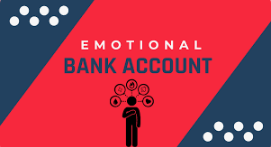By Patrick Cahillane – Life, Executive & Business Coach with One Source International Coaching and Training and Founder of The One Source Personal Development Network

In his best-selling book “The 7 Habits of Highly Effective People,” Stephen Covey introduces the concept of an Emotional Bank Account (EBA). According to Covey, an EBA represents the trust and goodwill that we have built up in our relationships with others. This trust and goodwill serve as a foundation for effective communication, collaboration, and problem-solving.
Just like a regular bank account, our Emotional Bank Account can be overdrawn or in credit. If we consistently make deposits into our account, such as through acts of kindness, understanding, and empathy, we build up a surplus of trust and goodwill in our relationships. Conversely, if we make withdrawals from our account, such as through lying, betraying, or being insensitive to others, we deplete our reserves of trust and goodwill.
The concept of an Emotional Bank Account can be applied to any type of relationship, whether it’s personal or professional. For example, in a marriage, deposits into the Emotional Bank Account could include showing appreciation, listening actively, and being thoughtful. Withdrawals could include being critical, ignoring one’s partner, or being defensive. In a work setting, deposits could include giving credit where it’s due, being supportive of colleagues, and communicating openly. Withdrawals could include taking credit for someone else’s work, being unresponsive to requests, or being dismissive of others’ opinions.
One of the benefits of the Emotional Bank Account concept is that it provides a framework for understanding the impact of our actions on others. It encourages us to be more mindful of our behavior and the effect it has on the people around us. It also highlights the importance of building and maintaining strong relationships, which can be essential for achieving our goals and living a fulfilling life.
To build a strong Emotional Bank Account, Covey recommends making regular deposits into the account through acts of kindness, understanding, and empathy. He also advises avoiding withdrawals by being honest, transparent, and considerate of others’ feelings. When we focus on making positive deposits into our Emotional Bank Account, we create a positive cycle of trust and goodwill that can lead to more effective communication, better problem-solving, and deeper, more meaningful relationships.
In conclusion, the concept of an Emotional Bank Account is a powerful tool for understanding the impact of our actions on others and building strong, trusting relationships. By making regular deposits into our account and avoiding withdrawals, we can create a positive cycle of trust and goodwill that can help us achieve our goals and live a more fulfilling life.
